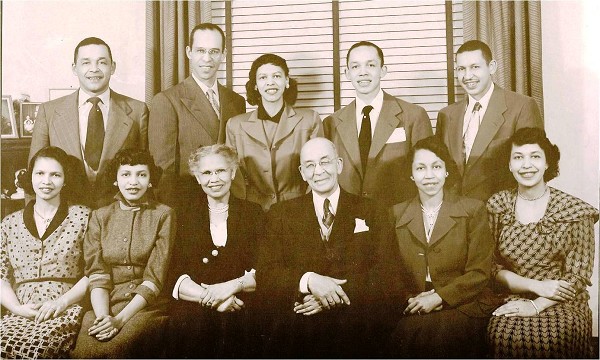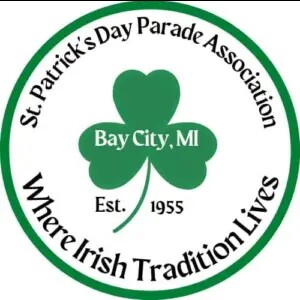
Oscar and Ida Baker and their nine children, several who were lawyers like Dad. BLACK DIAMONDS: Talk Eyes Area Blacks in Civil War, More History Notables
|
||||||||||||||||
| Printer Friendly Story View |
Local Black History is much better than Hollywood.
A black Union soldier from Midland, Michigan, encounters his Confederate brother on a Southern battlefield during the Civil War.
A young Virginia-born black servant to a Union general moves North to Bay City, Michigan, after the war and tells of escaping an infamous massacre of black troops.
Screenwriter's fiction?
No, it is historical lore of mid-Michigan that continues to amaze and has attracted researchers of military history in the 7th Michigan Cavalry Civil War Round Table.
The tellers of those tales were black Union Army soldiers from Bay City and Midland who survived the Civil War and returned to become important members of their communities. Both Bay City and Midland were said to have "minimal prejudice" and places where blacks could thrive.
Those tales were told by men who were upstanding Christian churchgoers and community members not known to be given to hyperbole.
The Black Network at The Dow Chemical Company at a Lunch and Learn Black History Month event on Friday heard a presentation by this columnist entitled "Black Diamonds in the Mid-Michigan Diaspora."
Among the "black diamonds" were the two soldiers, John Johnson and James H. Baker; Oscar W. Baker and the Baker family of Bay City; the Goodridge Brothers, noted Saginaw photographers; Saginaw's "one man track team" William Watson, the first black captain of a University of Michigan athletic team; and Freddie Highgate, Midland's secret street philanthropist.
Watson had won the U.S. decathlon championship in 1940 and was working as private secretary to boxing champ Joe Louis while training for the Olympics. Unfortunately, the Nazis invaded Poland and the Olympics was canceled -- his chance at undying fame was lost.
Highgate sold flowers and shrubs, hauling a wagon door-to-door in Midland from the 1920s until his death in 1937. He gave away to the poor much of the money he earned even though he might have become rich had he bought stock in the Dow Chemical Company. Freddie became a legendary Midland figure lauded by five ministers at his funeral.
The former soldiers were James H. Baker, who came to Bay City after the war, and John Johnson Sr. of Midland, who had emigrated from Canada to work in lumber mills here and entered the service in 1863.
After the war, at the urging of Midland mill owner John Larkin and G.W. Ball, father-in-law of Herbert H. Dow, Johnson commuted to Saginaw by stagecoach to learn his trade and established Midland's first barber shop.
James Baker also was a barber with a shop on Water Street in Portsmouth and a home on Broadway in Bay City. He raised eight children, including Oscar W. Baker, born in 1879, who lost a leg in a boyhood accident and against all odds would go on to found an important law firm.
James Baker asserted that he had been among a dozen or so black soldiers to survive the infamous Fort Pillow, Tennessee, massacre by CSA Gen. Nathan Bedford Forrest's rebels in 1864.
Baker's son Oscar lost a leg in a train accident as a seven-year-old in 1886. Running across the Pere Marquette crossing on 11th Street en-route to Washington School, he slipped and fell. The most horrible outcome short of death occurred: the train ran over his right leg and it had to be amputated almost to the hip.
He never had a wooden leg and he must have used crutches, although there is no photograph or news report of him doing so. Only once was he pictured so the fact he had only one leg was evident.
A $2,500 judgment won from a railroad for his injury financed most of Oscar's law studies. When the money got scarce in his final year the U-M law school authorities had a solution: we'll arrange for you to work for the State of Michigan in Lansing.
And we'll send your lessons to Lansing so you can finish your final year! True story!
So young Oscar Baker became keeper of the committee rooms at the state capitol, under the lieutenant governor Orrin W. Robinson, a Republican.
He sued the railroad again in 1903 and won the case, but got no money. However, the Supreme Court ruled court judgments were to be held in trust for minors from then on, setting an important precedent.
Later he built a successful law practice in overwhelmingly white Bay City and in 1915 even became president of the Michigan Freedmen, a statewide organization aiming to build understanding about race among the white population.
The main link of Bay City with the Civil War is the well-documented fact that Bay City abolitionist James Gillespie Birney organized the political movement that led to the founding of the Republican Party in Michigan in 1854.
In his candidacies for President and Michigan governor, organizing, public speaking and writing in newspapers from 1842 until he left the state in 1853, Birney spread the message that slavery was wrong, against the Constitution as well as opposed to the Christian tradition.
Birney's second run for President as the standard bearer of the Liberty Party, occurred in 1844 when he was living in Lower Saginaw, later Bay City.
Birney's abolitionist Liberty Party evolved into the Free Soil Party that brought anti-slavery advocates of all stripes, including Democrats and Whigs, together under one tent for the first time. The underlying ideology of the Liberty and Free Soil parties -- abolition of slavery -- was adopted by the Republicans.
The first statewide Republican convention was held Under the Oaks in Jackson in 1854, leading to the election of the nation's first Republican governor, Kingsley Bingham, that same year.
The election of Illinois lawyer Abraham Lincoln as the first Republican President resulted in the rebel attack on Fort Sumter in 1861 and the five year long Civil War costing about 630,000 lives.
My book Apostles of Equality, was published in 2011 by Michigan State University Press. This book contends that the 186,000 Colored Troops -- many recruited by Maj. Gen. William Birney, tipped the balance so the North won the war.
The book also tells how Confederate President Jefferson Davis turned down his own rebel soldiers who had voted to enlist more blacks.
Some blacks did fight for the Confederacy, risking their lives for a cause that probably would have continued them in slavery.
Midland's John Johnson, a 19-year-old lumber worker who had emigrated from Canada, was with the Third Michigan Cavalry under Gen. George Armstrong Custer. Johnson said he encountered his brother who was in the Confederate Army on a battlefield in the South.
In the records of the army of the Confederate States of America, a Frank Johnson was listed curiously as "slave/laborer & free Negro conscript" with the CSA Engineers.
A Midland Historical Society Publication, the Midland Log, commented: "Daughter-in-law Helen Johnson Hudson recalls Johnson Sr. telling her that at one point during the war he and his brother were briefly reunited during a battle, long enough for him to give his thirsty brother a drink before returning to their respective regiments. Folklore or fact, it made a nice story. Johnson's Civil War uniform is housed in the Midland Historical Society's permanent collection."
David and William Birney -- sons of the Bay City abolitionist -- were major generals, recruiting and leading colored troops. And James G. Birney IV, grandson, enlisted in Bay City and rode with Gen. Custer in the Michigan Cavalry Brigade that stopped the rebel cavalry under Gen. J.E.B. Stuart and helped the North win the crucial Battle of Gettysburg.
On April 8, 1865, Gen. William Birney and his black troops trapped the remnants of Robert E. Lee's Army of Northern Virginia as they neared Appomattox. Because he was halted and relieved of duty by Maj. Gen. E.O.C. Ord, Birney was denied the honor of capturing Lee and ending the war that day. Instead, Lee and his men were allowed to escape and fight another day. After another futile rebel attack costing about 600 lives, Lee finally was forced to surrender on April 9.
After Appomattox, Union soldiers ran military governments in Southern states to allow the former slaves to vote. That was ended after 11 years with a corrupt bargain in 1876 putting Republican Rutherford B. Hayes, as President over the winner, Democrat Samuel Tilden. Pro-slavery Democrats and the Ku Klux Klan founded by former General Forrest returned black people to virtual slavery until Civil Rights legislation in the 1960s.
The Underground Railroad ran through Bay City and out into Saginaw Bay, according to some historians. That indicated this was an alternate route to Canada, perhaps when the slave catchers were watching Detroit. The Chillson House on Midland Street on Bay City's west side was a safe house of the Underground Railroad, according to historical reports.
The Apostles book recounts how Kentucky slave catchers raided into Michigan, beginning in 1809. Michigan whites repulsed the raiders, leading to the adoption of the Fugitive Slave Law by Congress.
As a member of the National Lawyers Guild, Oscar Baker Jr. helped black voter registration in Mississippi during the 1960s. He recalled in a 1995 interview that one young black man he helped was assassinated. He rescued a white female Freedom Rider who had been arrested by police. Oscar recalled going into the interrogation room: "I walked in like the Colonel from the Plantation coming into the overseer's house, and I walked her out and they acted like I was white."
###
| Printer Friendly Story View |

|
Prior Article
March 5, 2025 by: Stephen Kent St. Patricks Parade 2025 - IT's TIME |

|
Next Article
March 5, 2025 by: Stephen Kent St. Patricks Parade 2025 - IT's TIME |
"The BUZZ" - Read Feedback From Readers! |
|
tennis1960 Says:
On March 04, 2015
at 08:50 PM
Very interesting story regrading the Bakers!. Keep up with the "spinets" of Bay City history. My Bay City keeps me informed of my childhood days through stories like these. Way to go D. L.
|
|
|

Dave Rogers |
|
|
|
Printer-Friendly Story View
0200 Nd: 12-08-2025 d 4 cpr 0
12/31/2020 P3v3-0200-Ad.cfm
SPONSORED LINKS
12/31/2020 drop ads P3v3-0200-Ad.cfm
